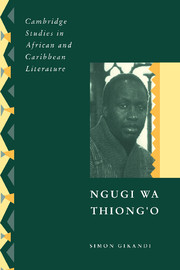Book contents
- Frontmatter
- Contents
- Preface
- Chronology
- 1 Introduction: reading texts and contexts
- 2 Narrative and nationalist desire: early short stories and The River Between
- 3 Educating colonial subjects: the “emergency stories” and Weep Not, Child
- 4 Representing decolonization: A Grain of Wheat
- 5 The poetics of cultural production: the later short stories and Petals of Blood
- 6 Performance and power: the plays
- 7 The prisonhouse of culture: Detained and Devil on the Cross
- 8 The work of art in exile: Matigari
- 9 Writing freedom: essays and criticism
- Conclusion
- Notes
- Bibliography
- Index
9 - Writing freedom: essays and criticism
Published online by Cambridge University Press: 09 February 2010
- Frontmatter
- Contents
- Preface
- Chronology
- 1 Introduction: reading texts and contexts
- 2 Narrative and nationalist desire: early short stories and The River Between
- 3 Educating colonial subjects: the “emergency stories” and Weep Not, Child
- 4 Representing decolonization: A Grain of Wheat
- 5 The poetics of cultural production: the later short stories and Petals of Blood
- 6 Performance and power: the plays
- 7 The prisonhouse of culture: Detained and Devil on the Cross
- 8 The work of art in exile: Matigari
- 9 Writing freedom: essays and criticism
- Conclusion
- Notes
- Bibliography
- Index
Summary
Ngugi first called attention to the close relation between his nonfictional and fictional works in the preface to Homecoming, his first collection of essays, where he noted that although his critical prose and literary works were differentiated by genre and the protocols and conventions of writing and reading, their conditions of production were similar. Many of the essays in this collection, he reminded his readers, were written at about the same time as his first three novels and were thus products of “the same moods”; they also touched “on similar questions and problems.” But even as he laid out the common ground occupied by his novels and essays, Ngugi was eager to separate their political function, and in this separation we can begin to understand the unseen ideological and aesthetic forces that have shaped his art and thought from the beginning of his artistic career as a student at Makerere University College to his preeminence as an African writer in exile. The creative writer, Ngugi reminded the readers of his first collection of essays, was “immersed in a world of imagination that is other than his conscious self. At his most intense and creative the writer is transfigured, he is possessed, he becomes a medium” (Homecoming, p. xv). Creative writing, Ngugi seemed to suggest, emerged out of an unconscious world (of drives and desires) and the novelist or poet was a genius in touch with higher creative forces. In contrast, the act of writing critical essays was motivated by the need to rationalize the author's “beliefs, attitudes and outlook” in a more “argumentative form” (p. xv). The fictional works had a symbiotic relationship to the critical essays, but the two could not be conflated.
- Type
- Chapter
- Information
- Ngugi wa Thiong'o , pp. 247 - 285Publisher: Cambridge University PressPrint publication year: 2000



